Nur 631 topic 14 Study guides, Class notes & Summaries
Looking for the best study guides, study notes and summaries about Nur 631 topic 14? On this page you'll find 18 study documents about Nur 631 topic 14.
Page 2 out of 18 results
Sort by
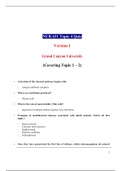
-
NUR 631 Topic 4 Quiz - version1
- Exam (elaborations) • 4 pages • 2020
- Available in package deal
-
- $24.99
- + learn more
NUR 631 Week 4 Quiz - version1 ------------------------------------------------- Cover Topic 1-2 1.Question: Activation of the classical pathway begins with: 2.Question: Where are antibodies produced? 3.Question: What is the role of natural killer (NK) cells? 4.Question: Examples of multifactorial diseases associated with adults include: (Select all that apply.) 5.Question: Once they have penetrated the first line of defense, which microorganisms do natural killer (NK) cells actively attack? 6....
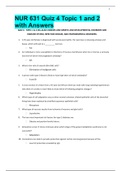
-
NUR 631 Quiz 4 Topic 1 and 2 with Answers | LATEST ANSWERS
- Exam (elaborations) • 3 pages • 2021
-
- $12.49
- + learn more
NUR 631 Quiz 4 Topic 1 and 2 with Answers NUR 631 Quiz 4 Topic 1 and 2 CELLULAR CHANGES AND GENETIC AND DEVELOPMENTAL DISORDERS AND IMMUNE SYSTEM, INFECTION DISEASE, AND ENVIRONMENTAL DISORDERS. 1. A 35-year-old female is diagnosed with acute pancreatitis. Her pancreas is releasing amylase and lipase, which will lead to a _________ necrosis 2. An individual is more susceptible to infections of mucous membranes when he or she has a seriously low level of which immunoglobulin antibody? 3...
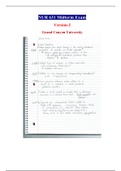
-
NUR 631 Topic 8 Midterm - version2
- Exam (elaborations) • 11 pages • 2020
- Available in package deal
-
- $24.99
- + learn more
NUR 631 Topic 8 Midterm - version2 ----------- 1.Question: What causes the rapid change in the resting membrane potential to initiate an action potential? 2.Question: What type of necrosis is often associated with pulmonary tuberculosis? 3.Question: What is an example of compensatory hyperplasia? 4.Question: Law plasma albumin causes edema as a result of a reduction in which pressure plasma oncotic: 5.Question: When a child inherits a disease that is autosomal recessive, it is inherited from who...
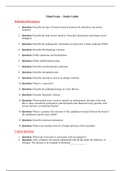
-
NUR 631 Final Exam Study Guide - Questions but no answer. See How Well You're Prepared
- Study guide • 4 pages • 2020
-
- $14.79
- + learn more
NUR 631 Topic 16 Final Exam Study Guide: Session 2020 1. Question: Describe the type of lesions found in psoriasis & seborrheic and actinic keratosis. 2. Question: Describe the skin lesions found in Varicella (chickenpox) and herpes zoster (shingles). 3. Question: Describe the pathogenetic mechanism of polycystic ovarian syndrome (POS). 4. Question: Describe Hirschsprung’s disease. 5. Question: Define marasmus and kwashiorkor. 6. Question: Define deafferentation pain. 7. Question: Describe myo...
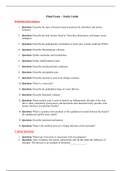
-
NUR 631 Topic 16 Final Exam Study Guide: Session 2020.
- Study guide • 4 pages • 2020
-
- $14.98
- + learn more
NUR 631 Topic 16 Final Exam Study Guide: Session 2020 1. Question: Describe the type of lesions found in psoriasis & seborrheic and actinic keratosis. 2. Question: Describe the skin lesions found in Varicella (chickenpox) and herpes zoster (shingles). 3. Question: Describe the pathogenetic mechanism of polycystic ovarian syndrome (POS). 4. Question: Describe Hirschsprung’s disease. 5. Question: Define marasmus and kwashiorkor. 6. Question: Define deafferentation pain. 7. Question: Describe myo...
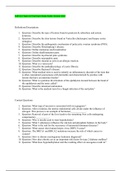
-
NUR 631 Topic 16 Final Exam Study Guide: Session 2020
- Study guide • 4 pages • 2020
-
- $14.49
- + learn more
NUR 631 Topic 16 Final Exam Study Guide: Session 2020 1. Question: Describe the type of lesions found in psoriasis & seborrheic and actinic keratosis. 2. Question: Describe the skin lesions found in Varicella (chickenpox) and herpes zoster (shingles). 3. Question: Describe the pathogenetic mechanism of polycystic ovarian syndrome (POS). 4. Question: Describe Hirschsprung’s disease. 5. Question: Define marasmus and kwashiorkor. 6. Question: Define deafferentation pain. 7. Question: Describe my...
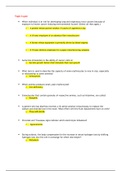
-
Grand Canyon University:NUR 631 Topic 6 Quiz Latest;100% Score
- Exam (elaborations) • 3 pages • 2020
- Available in package deal
-
- $10.98
- + learn more
(NUR 631 Topic 6 Quiz Collection) NUR 631 Topic 6 Quiz – Q & A Question: Which individual is at risk for developing lung and respiratory tract cancers because of exposure to known cancer-inducing environmental factors? (Select all that apply.) Question: Autocrine stimulation is the ability of cancer cells to: Question: What term is used to describe the capacity of some erythrocytes to vary in size, especially in relationship to some anemias? Question: Which anemia produces small, pale erythroc...
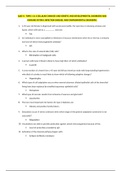
-
NUR 631 - QUIZ 4: TOPIC 1 & 2 CELLULAR CHANGES AND GENETIC AND DEVELOPMENTAL DISORDERS AND IMMUNE SYSTEM, INFECTION DISEASE, AND ENVIRONMENTAL DISORDERS.
- Exam (elaborations) • 3 pages • 2020
- Available in package deal
-
- $13.49
- + learn more
NUR 631 Topic 4 Quiz, Grand canyon, 100% All Correct 1. Question: A 35-year-old female is diagnosed with acute pancreatitis. Her pancreas is releasing amylase and lipase, which will lead to a _________ necrosis 2. Question: An individual is more susceptible to infections of mucous membranes when he or she has a seriously low level of which immunoglobulin antibody? 3. Question: What is the role of natural killer (NK) cells? 4. Question: A person with type O blood is likely to have high titers of ...



